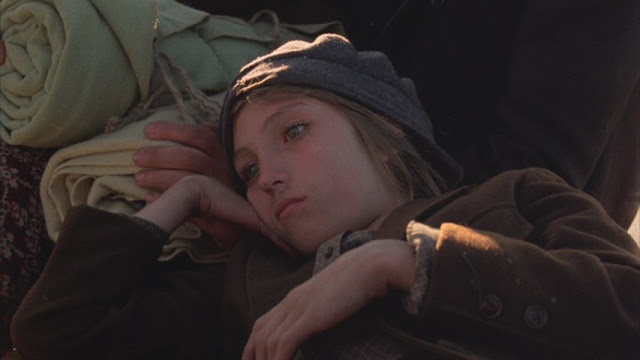Written by Rachel Redfern.
Terrence Malick’s 1978 film, Days of Heaven, is considered a film classic well-known for it’s portrayal of the American myth and its spectacular cinematography (though I don’t think I know anyone who’s ever seen it).
The film is typical Terrence Malick, a bit pretentious, with a lack of dialogue and a struggle with continuous narrative, but beautiful and unique at the same time. Set against the poverty of the Great Depression, Richard Gere (Bill) stars as a transient worker in the Texas Panhandle traveling with his girlfriend, Brooke Adams (Abby), and his younger sister Linda Manz (Linda) who is also the narrator. While working at a wheat farm, the dying owner of the farm falls in love with Abby who he believes is also Bill’s sister. Bill encourages Abby to marry the farmer since he’ll be dying soon anyway and they obviously need the money. A love triangle results, bad things happen, fire and death ensues.
There’s the obvious sort of concerns a feminist would have for a film with a plot like this; first, Bill seems to think its fine to pimp out his girlfriend and then get’s angry when she actually falls for the guy. Second, both men fight over her and no one ever seems to ask her what she wants. However, I found the movie surprising because in the end, it’s Linda and Abby who are the driving force of the film and who both show independence as they move forward in life.
The most interesting character in this film though is Bill’s younger sister, a street-wise little girl who’s blunt narrative underscores her own realistic perceptions of the world. Strangely adult, with a rambling, youthful narration style, she accepts the events of her life without too much fuss, offering a sensible, down-too-earth, yet empathetic commentary on the actions of her brother and his girlfriend.
 |
| Linda Manz as Linda in Days of Heaven |
Both of the women are calmly accepting of the events of their life and are highly adaptive. While the whole world is burning around them and they seem to be losing everything, they continue to survive and try to make a new life for themselves wherever they’re thrown. In the end, despite the damage that’s been caused in their name, the two women are hopeful and even excited about their future.
It’s this adaptive nature that I find so compelling in these two protagonists and seems to be a theme I’ve noticed in most female narratives. For example, think of pretty much any movie with single mothers, or Skyler from Breaking Bad, Scarlet O’Hara in Gone With The Wind (not a nice example, but definitely adaptive), Steel Magnolias, Fried Green Tomatoes, The Color Purple, Winter’s Bone, (hell, Ripley in Alien). Each of these female characters is moved about and acted upon and thrown into unexpected situations, yet each manages to thrive. Perhaps in a world where so much has been dictated to them, this adaptive nature of so many women is a natural result.
